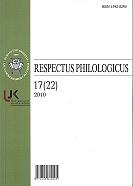ELEKTRONINIO KALBŲ MOKYMO INTERAKCIJOS SĄVOKA: MOKSLO TIRIAMŲJŲ DARBŲ APŽVALGA
REVIEW OF RESEARCH METHODS ON LANGUAGE E-LEARNING INTERACTIONS
Author(s): Vilhelmina VitkauskienėSubject(s): Language and Literature Studies
Published by: Vilniaus Universiteto Leidykla
Keywords: interakcija1; elektroninio kalbų mokymo interakcijos (EKMI)2; eksperimentiniai mokslinės analizės metodai3; aprašomieji mokslinės analizės metodai4; hibridiniai metodai5; turinio analizė6; mokymasis su globėju7; diskurso analizė8;
Summary/Abstract: Drawing upon the specifics of e-learning in general and language e-learning in particular, a definition of the terms e-learning and e-learning interactions is provided. The present article defines e-learning in¬teractions as the spatial synergy between two main elements – namely, the information technologies and human factor. In this study, the state of the foreign language e-learning to date on the basis of the works by French linguist Mangenot is being discussed. It has been found that most scientific re¬search on language e-learning interactions has been done in the Anglo-Saxon countries and France. Having attempted to categorise all these works by nature of the method used, two large groups of methods were distinguished: experimental (quantitative) and descriptive (qualitative). Their respective advantages, drawbacks and differences were outlined. The line between experimental and descriptive methods is not always apparent. While there is no basis at this time to claim a discovery of genuine scientific theories, there are already a number of experts working exclusively in this domain. Computer-mediated communications (CMC, French abbreviation CMO), or interaction through computers, is the most favourable field of research on e-learning interactions for a teacher or linguist. This area has already warranted inter¬vention by language scientists (the forerunners in this respect being Anis in France and Herring in the U.S.A.), sociologists, IT and communications specialists. In most cases, descriptive (qualitative) methods are applied in order to describe interac¬tion between new practical language exercises and the technical tools used. Many specific, especially educological queries arise in this respect. All the means, tasks and materials used by a teacher or pupil are investigated.
Journal: Respectus Philologicus
- Issue Year: 2010
- Issue No: 17 (22)
- Page Range: 195-204
- Page Count: 10
- Language: Lithuanian

